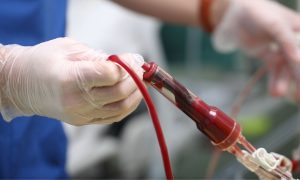Doctors Letter in Medicine Magazine A 28-year-old woman was transferred to our hospital at 27 + 6/40, G5P2, with pre-eclampsia. Acute promyelocytic leukaemia (APL) with disseminated intravascular coagulation was diagnosed
The patient was a Jehovah’s Witness with an advanced care directive refusing the transfusion of red cells, white cells, platelets or plasma, and all minor fractions including albumin, immunoglobulins and clotting factors. She continued to refuse blood products, despite understanding the circumstance-specific consequences, including death.
Antihypertensives, prednisone and all-trans-retinoic acid were commenced. Chemotherapy was deemed unsafe in the setting of upcoming delivery without blood product support. Foetal death in utero was followed by vaginal delivery with minimal blood loss. Subsequently, the patient developed an ischaemic stroke, febrile neutropenia and multi-organ failure. Treatment was withdrawn on day 13.
Staff were distressed, grappling with what was perceived as two ‘avoidable’ deaths.

APL has a >90% cure rate. In pregnancy, complete remission rates of 83% are reported, and foetal outcomes are reasonable when diagnosis occurs in the second or third trimesters.[1] Good outcomes are also reported in the case of a Jehovah’s Witness declining blood products.[2] We document this poor outcome to assist other health professionals in providing balanced information to patients in this circumstance, to explore the ethical considerations and to discuss potential strategies to manage internal conflict as a practitioner.
Not administering blood products in this case undoubtedly contributed to the death of mother and foetus. This was because maternal autonomy was respected – which reflects broad legal and ethical consensus that competent adults may refuse any form of medical intervention – even where that intervention is lifesaving.[3] Refusal of a lifesaving intervention by an informed patient is generally well respected, but the rights of a mother to refuse such interventions on behalf of her foetus is more controversial. A doctor indeed has moral obligations to both the pregnant woman, and perhaps with differing priority to the unborn foetus.[4] Circumstances where foetal and maternal autonomy conflict, or where foetal beneficence conflicts with maternal autonomy, create challenges. All decisions should be strictly within the parameters of informed consent – disclosure, comprehension and free consent – and place patient autonomy at the forefront.[5] We advocate the use of a multidisciplinary approach, including obstetrics, neonatology, haematology and clinical ethics, with consistent delivery of accurate, comprehensive information over several clinical encounters. Signed patient disclosures and advanced care directives may be useful in facilitating management plans.
There is little published information to assist physicians to manage their own anxieties, doubts and potential moral disagreement with the patient, and to help them maintain respect for a patient and continue to deliver good medical care. To improve care, we recommend developing a clear understanding of your own attitudes and beliefs, open communication between staff, identifying alternative practitioners where time permits, and accessing staff counselling.
It is helpful to understand the basis of Jehovah’s Witness’ beliefs;[5] however, the ethical conflicts and considerations apply more broadly. Indeed, as more foetal-specific treatments become available, conflict between the best interests of mother and foetus will increase.[6] Physicians are required to apply ethical principles rationally and respect patients’ decisions irrespective of their own beliefs.
References
1 Yang D, Hladnik L. Treatment of acute promyelocytic leukemia during pregnancy. Pharmacotherapy 2009; 29: 709–724.
2 Lin C-P, Huang M-J, Liu H-J, Chang I-Y, Tsai C-H. Successful treatment of acute promyelocytic leukemia in a pregnant Jehovah’s Witness with all-trans retinoic acid, rhG-CSF, and erythropoietin. Am J Hematol 1996; 51: 251–252.
3 DiGiovanni LM. Ethical issues in obstetrics. Obstet Gynecol Clin North Am 2010; 37: 345–357.
4 Levy JK. Jehovah’s Witnesses, pregnancy, and blood transfusions: a paradigm for the autonomy rights of all pregnant women. JLME 1999; 27: 171–189.
5 Mahoney K, Valenti J. Blood refusal & obstetrics. A high-risk case scenario. AWHONN Lifelines 2004; 8: 220–225.
6 Townsend SF. Ethics for the pediatrician: obstetric conflict: when fetal and maternal interests are at odds. Pediatr Rev 2012; 33: 33–38.
http://onlinelibrary.wiley.com/doi/10.1111/imj.12711/epdf





